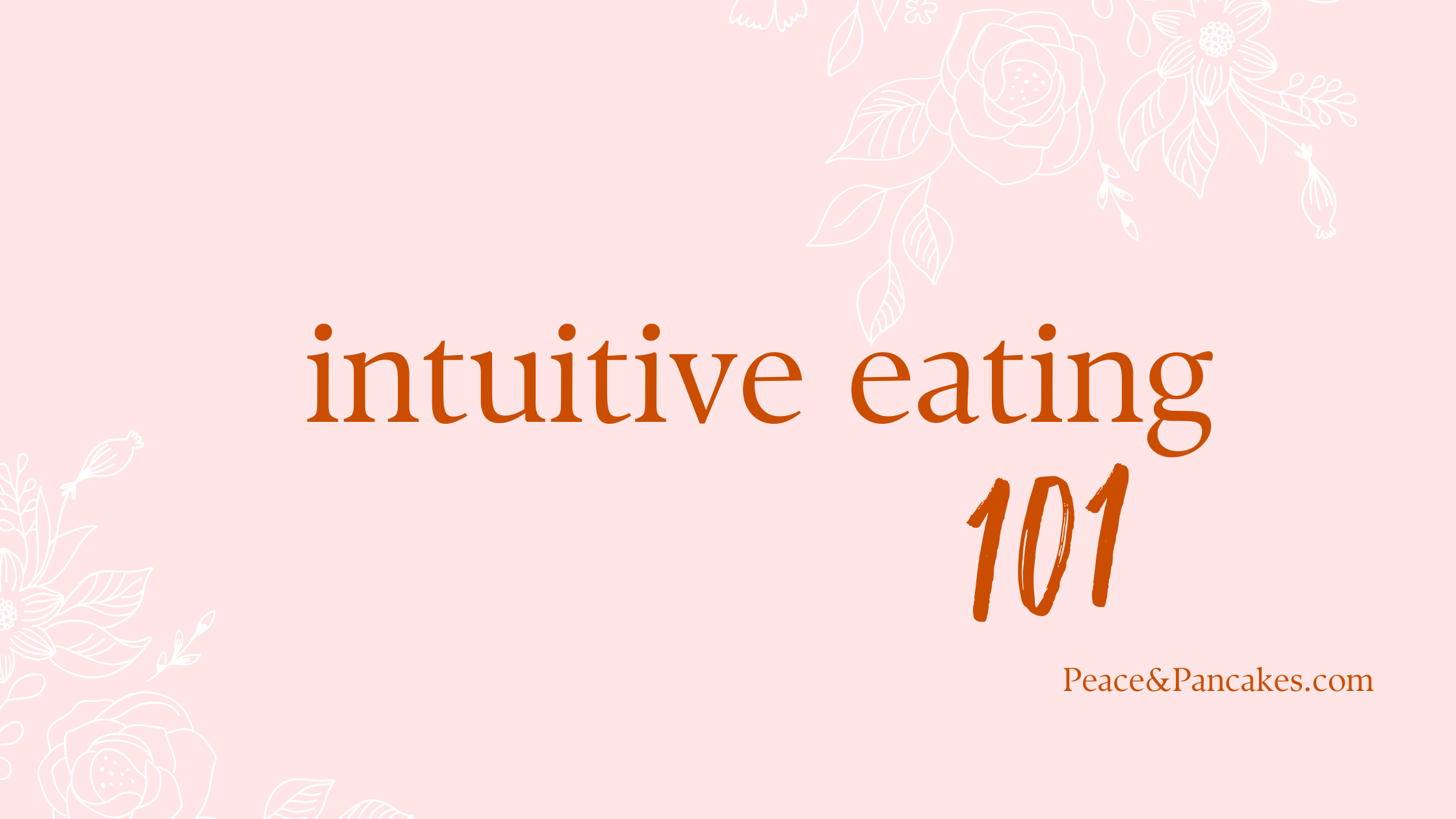Intuitive Eating 101
By Dietetic Intern Maddie Waksmunski
You aren’t born holding judgments of what the “proper portion” size is or labeling foods as “good” or “bad” but rather the pure and simple instinct to know when you are hungry and how much you need to eat. If you watch any baby, you may notice they naturally react to their hunger and fullness cues. When a baby is hungry, they usually cry until someone feeds them. They will eat until they are full and refuse more food. You may also notice that toddlers are satisfied with eating less on some days and may eat more on other days. This is because we do not need the same amount of food every single day.
Unfortunately, from a young age, you are exposed to outside factors including diet culture, social media, and familial/peer pressure that disrupt your innate connection with your body’s cues. For example, you may have grown up with parents or caregivers who tried to limit how much you ate. On the contrary, they may have taught you to finish all the food on your plate even when you were already full or that dessert is a reward for finishing your meal and eating all your vegetables.
If this sounds like you, then Intuitive Eating may be a helpful approach.
What is intuitive eating?
Intuitive eating is a non-diet approach that focuses on using emotion, instinct, and conscious thought to guide eating decisions. This non-judgmental approach involves slowing down and listening to your body, honoring internal satiety cues, and understanding how different foods make you feel.
Is intuitive eating a diet?
Intuitive eating goes against dieting, which uses a more restrictive approach to health and doesn’t consider individual needs. While dieting may be more anxiety-inducing due to the rules and micromanagement of food, intuitive eating allows for personal freedom and self-compassion. It is built on the foundation of unconditional permission to eat all foods, which goes against diets that expect you to cut out certain foods or entire food groups.
Will intuitive eating help me lose weight?
Intuitive eating shifts away from the focus on weight and instead promotes the exploration of physical and mental health without looking at the scale. Your weight may fluctuate in either direction or may not change at all when you are first learning how much food is appropriate for your body and what eating patterns best fit the needs of your lifestyle.
Be kind to yourself. Instead of fixating on the number on the scale, consider other health indicators: How energized do you feel? Are you having fewer uncontrollable cravings? Etc.
What are the benefits of intuitive eating?
- Heals your relationship with food
- Increases motivation for staying active and healthy
- Improves optimism and heightens self-esteem
- Improves body image and appreciation of your own body
- Improves quality of diet
- Higher HDL cholesterol levels and lower triglyceride levels
- Decreases emotional and disordered eating
I’m so busy — what are some simple ways I can start incorporating intuitive eating?
1. Make time in the morning to eat breakfast.
If you have a busy schedule, it can be easy to skip breakfast, but you probably don’t perform your best when you are under-fueled. Consider your schedule:
- If you work remotely: Maybe you can get half an hour of work done and then take a break to eat.
- If you commute to work: Set aside time to make and eat your breakfast before leaving.
- If you only have five minutes for breakfast: Plan ahead by meal prepping something the night before.
It’s okay if some days you have to run out the door without a chance to eat a proper breakfast — just be more aware of how you feel throughout the day.
2. Keep snacks around.
Packing a lunch for work or school may not be enough food for an entire day. Bring snacks to stay energized and fueled throughout the day. It may help to have snacks in your bag, desk, car, or wherever you may find yourself needing an energy kick.
3. Stay hydrated.
Bring a reusable water bottle to work or school, and keep it next to you while working to remind yourself to drink water throughout the day. In addition to simplifying your fluid intake, this can save money and is better for the environment compared to disposable plastic water bottles.
What if I’m not hungry in the morning or throughout the day?
You may not always be hungry in the morning or at other points in the day, but intuitive eating also considers being practical about preventing extreme hunger in situations where you can’t eat full meals. For example, you’re not hungry right now, but you don’t want to be uncomfortably hungry as soon as an important meeting starts at work; this not only decreases your energy but also worsens your mood and influences your digestion. Thus, if you know you won’t get a chance to eat until a few hours into your work, prepare accordingly.
So does intuitive eating mean I eat when I’m hungry and stop when I’m full?
Though intuitive eating does involve listening to hunger and fullness cues, there is so much more to it. Intuitive eating teaches you to learn from situations where you feel too hungry or eat beyond fullness and how to move on from that without feeling guilt or shame.
Honoring your hunger does not mean solely eating when you are hungry, but also honoring your lifestyle habits and accommodating to avoid situations where hunger turns into feeling ravenous. For example, you may need to eat before you are hungry to accommodate your busy schedule to prevent overeating at your next meal or snack.
But if I give myself unconditional permission to eat all foods, I’ll eat junk food all the time!
Many people think that when you give yourself unconditional permission to eat all foods, you’ll lose control and won’t be able to stop eating. In reality, the opposite happens. You don’t always want those sweet treats and snacks, but you have them when you’re craving them. You only eat until satisfied because you know they are available for when you want them next.
What do you think? Would you like to give intuitive eating a try? Let us know in the comments!
References
- Gast J, Campbell Nielson A, Hunt A, Leiker JJ. Intuitive eating: associations with physical activity motivation and BMI. Am J Health Promot. 2015 Jan-Feb;29(3):e91-9. doi: 10.4278/ajhp.130305-QUAN-97. PMID: 24459999.
- Hazzard VM, Telke SE, Simone M, Anderson LM, Larson NI, Neumark-Sztainer D. Intuitive eating longitudinally predicts better psychological health and lower use of disordered eating behaviors: findings from EAT 2010-2018. Eat Weight Disord. 2021 Feb;26(1):287-294. doi: 10.1007/s40519-020-00852-4. Epub 2020 Jan 31. PMID: 32006391; PMCID: PMC7392799.
- Keirns NG, Hawkins MAW. The relationship between intuitive eating and body image is moderated by measured body mass index. Eat Behav. 2019 Apr;33:91-96. doi: 10.1016/j.eatbeh.2019.04.004. Epub 2019 Apr 23. PMID: 31048247; PMCID: PMC6535356.

